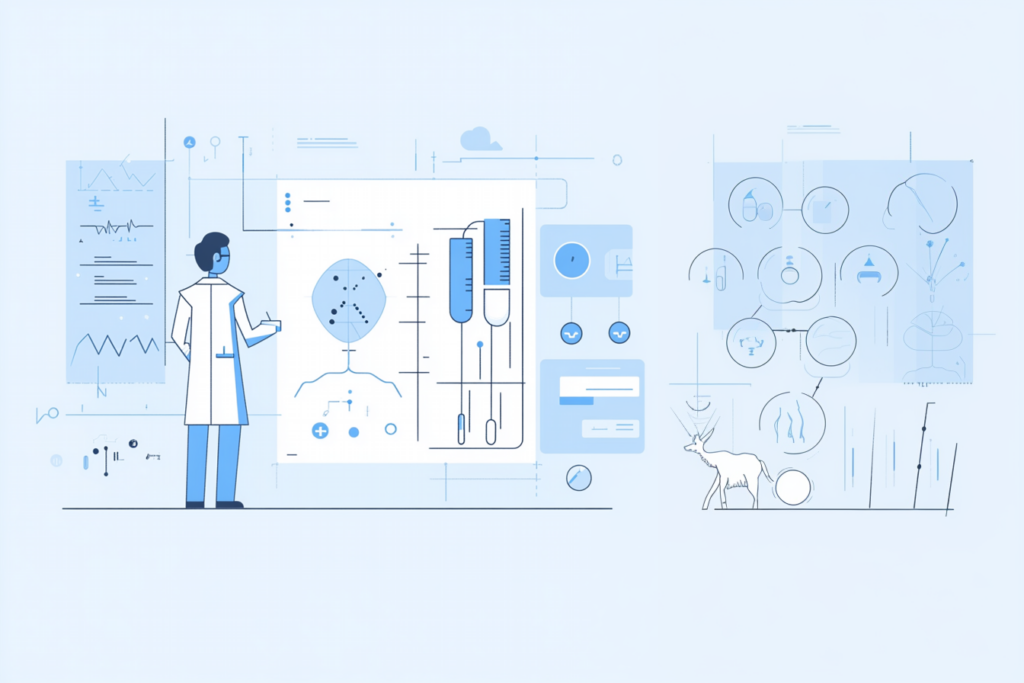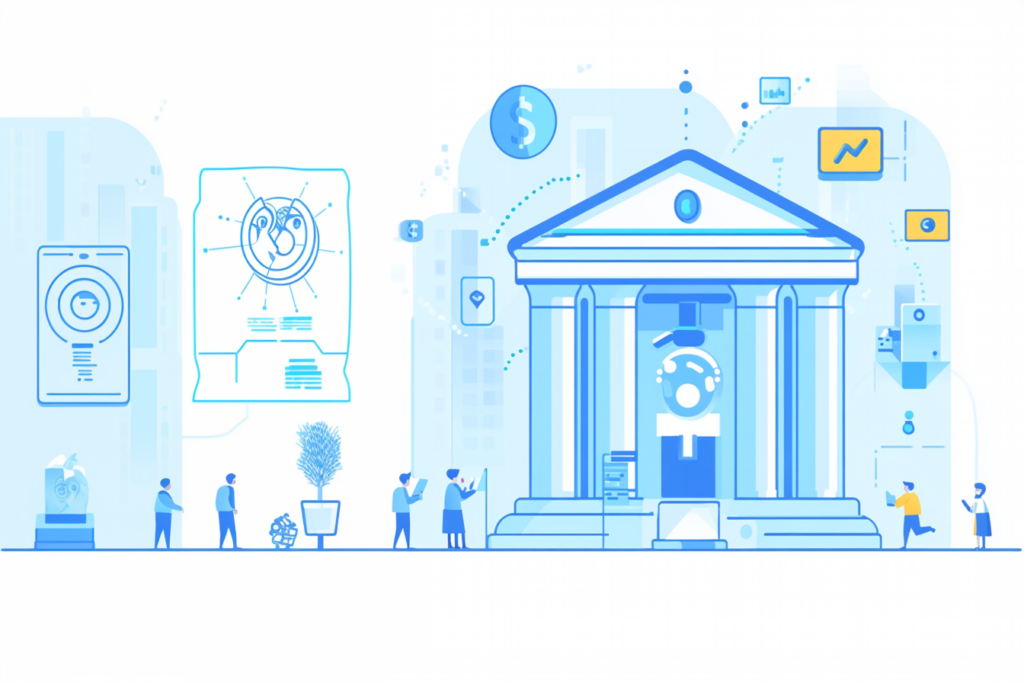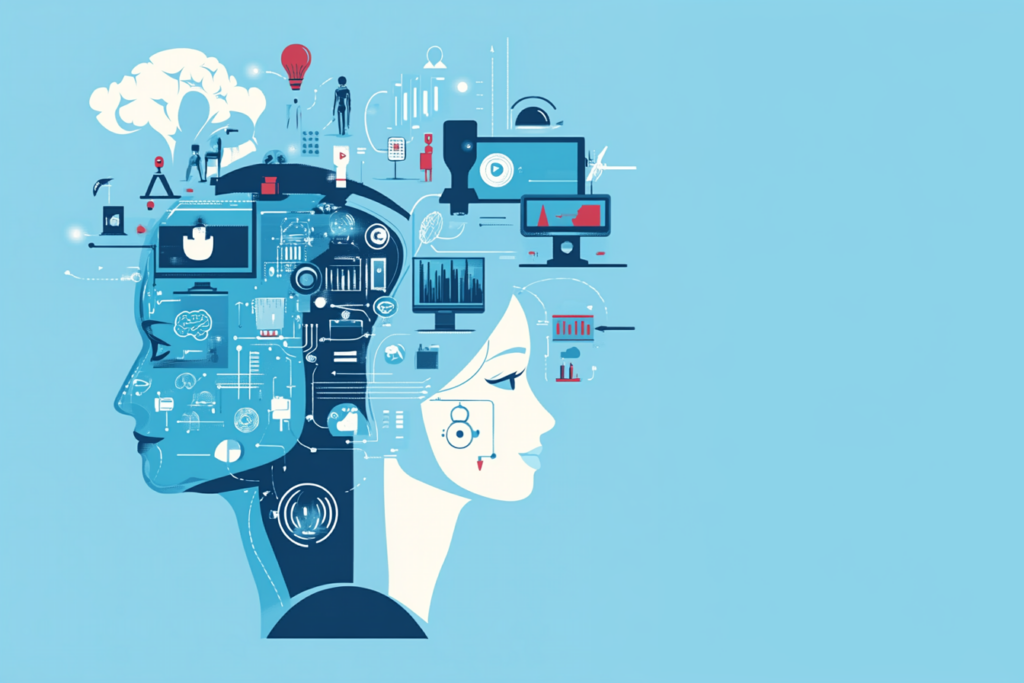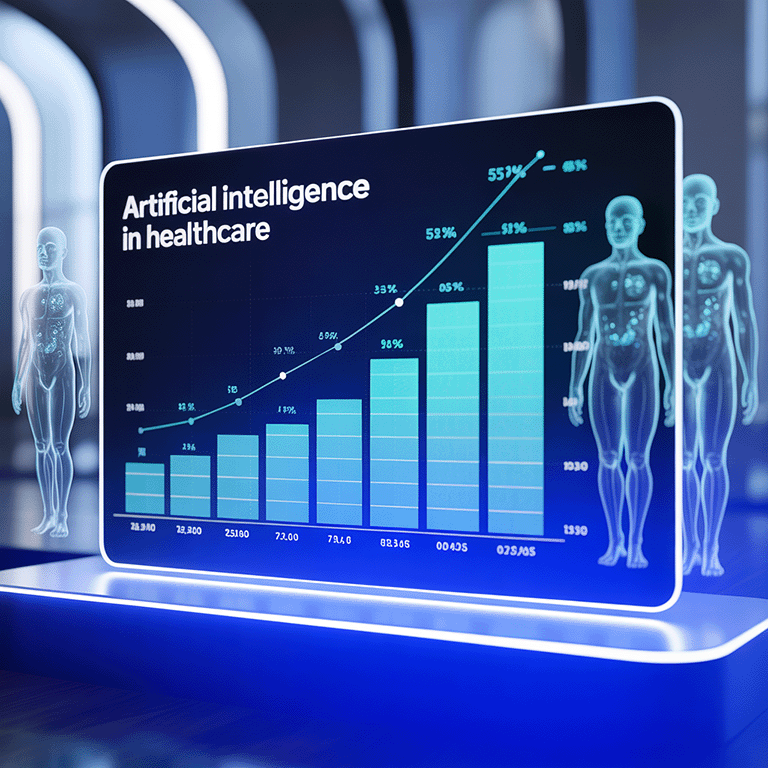AI is revolutionizing industries by optimizing operations and enabling data-driven decision-making. This technology can potentially transform branches like healthcare, manufacturing, banking, and even customer services through operation simplification and decision improvement. Other spheres where it has found its applicability include finance and retail, among others, through process automation.
Organizations that have already tapped into the power of AI are seeing its benefits in terms of customer satisfaction, lower operating expenses, and increased profits. Indeed, more than 60% of business owners think AI will help them build better customer relationships.
This article deals with some of the prevalent AI use cases across top industries, changing how businesses run their operations going forward.
Impact of AI on Business Workflows
Artificial Intelligence (AI) has already changed how businesses function by taking over regular activities, improving decision processes, and increasing productivity. From analyzing data to machine learning, AI in various industries is used to predict trends or streamline operations, leading to a better customer experience.
AI is reshaping global dynamics with disruptive capabilities that were unheard of not long ago. In the ever-changing terrain of today’s digital world, Artificial Intelligence is the melting point for machine learning, creativity, and human-like decisions. According to a Statista Report, the market size of Artificial intelligence (AI) is estimated to reach $826.70 billion by 2030, growing at a CAGR of 28.46%. This highlights that industry players in different sectors keep on looking for ways to adopt AI into their businesses.
What Industries Do Use Artificial Intelligence?
AI is helping different industries work more effectively by cutting operating costs, automating processes, and making better choices, resulting in better customer experiences using predictive analytics and making them more agile and competitive in the marketplace.

Healthcare
AI has been transforming how healthcare is working. It helps patients get better results, makes the organization more efficient, and speeds up the pace of new medical ideas.
Diagnostic Imaging: AI tools help radiologists interpret medical images (e.g., X-rays, MRI scans) used for diagnostic imaging. They can easily identify abnormalities such as tumors, fractures, or other medical conditions and are very accurate, which reduces errors associated with human activities and leads to early detection of diseases.
Personalized Medicine: AI technology utilizes data from patients’ historical files plus genetic records while monitoring their condition to advise them more about potential treatment plans. As a result, each patient gets treatments that work best for them, speeding up their recovery.
Drug Discovery and Development: AI makes it possible to speed up the drug discovery process by forecasting the interactions between molecules and recommending promising candidates for new medicines. Besides, it helps optimize clinical trials, thus shortening the duration of these therapies’ arrival on the market.
Company: IBM Watson Health
- AI Application: IBM Watson employs artificial intelligence to sift through health-related records, helping personalize patient care and guiding doctors using factual data. It uses AI programs that can suggest various treatment options based on the information taken from patient records, standard medical principles, ongoing studies in the field, etc.
Retail and E-commerce
In retail and e-commerce, AI improves the shopping experience and helps simplify processes, influencing business growth by making better decisions.
- Recommendation Engines: Recommendation engines work by taking into account customer behavior, such as purchase history or preference, hence giving suggestions explicitly tailored based on past choices. It improves conversion rates and encourages client loyalty, cross-selling, and up-selling.
- Inventory Management: By studying the patterns exhibited during sales periods and analyzing how commodities move within time, AI can predict future stock needs, avoid overstocking and stockouts, and ensure the availability of correct goods in appropriate quantities, leading to fewer business expenses.
- Customer Service Automation: AI chatbots help companies by responding to customers and guiding them so that they can complete their online shopping within the shortest time possible. The latest models minimize costs and increase customer satisfaction due to quick response times.
Company: Amazon
- AI Application: Amazon’s recommendation engines apply AI to analyze customer behavior and purchase history to suggest items and improve their browsing experience, increasing the company’s sales volume. Furthermore, AI is used by Amazon Go outlets to improve customer experience through cashier-less checkouts using computer vision technology to keep track of products picked by customers.

Banking and Finance
AI is changing the banking and finance industry by improving fraud detection, ensuring better client involvement, and optimizing trade strategies.
- Detecting fraud: Algorithms in Artificial Intelligence monitor patterns of activities in financial transactions, recognizing strange behaviors that might indicate fraud. When a bank identifies such transactions, it acts to prevent losses from fraudulent activities while enhancing security.
- Trade using algorithms: AI allows for complex trading strategies by analyzing market information and instantly executing trades informed by the same data. As a result of these automatic systems being faster to react to given market conditions than people, optimal returns upon investment are achieved.
- Customized financial services: AI peruses customer information to advise on finance that best suits each customer, recommending loans or investments and creating personal banking experiences.
Company: JP Morgan Chase
- AI Application: JP Morgan Chase uses Artificial Intelligence systems to identify fraudulent transaction patterns in real-time, hence flagging any actions that may be considered shady. Furthermore, this company also employs an Automated Intelligence Program, which manages legal document reviews, thus cutting down on time and costs incurred during various legal assignments.
Supply Chain and Logistics
AI is crucial because it leads to better accuracy in forecasting supply chain operations, automating processes, and reducing expenses.
- Predictive Maintenance: AI-driven sensors in logistics and supply chain management systems can predict the failure of machinery or vehicles well before they stop working. This allows companies to proactively schedule maintenance, thereby reducing unplanned downtimes and lengthening the life of their equipment.
- Route Optimization: Through real-time weather information and traffic updates, AI suggests quicker ways for deliveries, depending on circumstances at that very moment, leading to improved fuel efficiency, faster delivery times, and lower costs per trip.
- Inventory Optimization: This system can forecast sales patterns based on previous transactions plus other factors like seasons, thereby helping managers decide how much stock they need to carry so as not to run out during high-demand periods, such as Christmas.
Company: DHL
- AI Application: DHL employs AI for predictive analytics to enhance delivery logistics, optimizing routes based on traffic patterns, weather conditions, and other variables. This improves delivery times and reduces operational costs.
Travel
Artificial intelligence works in the travel industry by personalizing travel and boosting efficiency, enabling customers to travel more easily.
- Tailored Travel Recommendations: By examining a user’s past travel behavior and preferences, AI algorithms can recommend personalized tours, bookings, and actions. In doing so, travel companies who use this kind of personalization can give better experiences to their customers and create loyalty around their brands.
- Variable Pricing Systems: Dynamic pricing powered by artificial intelligence varies the cost of air tickets, hotels, and rental cars at any particular time, taking seasonality, demand, and competitors’ prices into consideration, hence ensuring that clients buy at competitive rates while businesses reap maximum profits.
- AI-Powered Client Support: At any time, the AI-driven chatbots can assist travelers in making bookings or cancelations and answer their questions instantly. This is beneficial for enhancing customer experience and minimizes human involvement.
Company: Booking.com
- AI Application: Booking.com uses AI to provide personalized travel recommendations and dynamic pricing. Their AI algorithms analyze user data to suggest tailored accommodations and travel experiences, enhancing customer satisfaction.
Real Estate
AI can transform real estate by automating the management of properties and increasing customer satisfaction, enabling data-driven choices.
- Valuation of Property: AI examines market trends, property features, and location data to accurately give a real estate property’s current value. This ensures that realtors, investors, and individual buyers invest wisely in property.
- Virtual Tour of Properties: Through augmented and virtual reality, artificial intelligence (AI) helps real estate companies provide customers with virtual property tours, allowing them to view houses without physically visiting them.
- Predictive Analysis in the Market: By assisting in predicting future property prices and demand trends, artificial intelligence supports strategic decision-making processes in the real estate sector and enhances investment performance.
Company: Zillow
- AI Application: Zillow uses artificial intelligence to estimate the value of homes and forecast real estate market patterns. Machine learning algorithms are behind the Zestimate function, providing useful figures for people’s home values through data like location and market conditions.

Media and Entertainment
AI is changing the way content is created, distributed, and consumed in the media and entertainment industry:
- User Activity Tracking: Using AI technology, user experience preferences and viewing past are analyzed, thus enabling platforms such as Netflix, Spotify, and YouTube to suggest customized content. This helps to keep users interested and encourages them to spend more time on the platform.
- Automated Generation of Content: Journalists may not have to create content on their own thanks to such AI tools as Natural Language Processing. Various newsrooms worldwide employ this technology to update news content in real-time or perform repeated tasks.
- Insightful Targeting of Audience: Media firms find in-depth information about their audiences using artificial intelligence, which results in improved content delivery, better ad placement, and higher-level interactions with consumers.
Company: Netflix
- AI Application: Netflix uses artificial intelligence to recommend content based on its genre. In exchange, viewers can watch various movies and shows that suit their tastes. Thus, it leads to high levels of interaction and more time spent on the platform.
Manufacturing
Speaking of AI is manufacturing, it uses automation and predictive analytics to enhance productivity, quality, and operational efficiency.
- Predictive Maintenance: AI-enabled sensors can monitor machines in real time, detecting wear early and reducing the probability of breakdowns. By planning for maintenance before breakdowns happen, manufacturers manage to cut down on expensive idle time and increase the life span of machines.
- Production Process Optimization: Artificial Intelligence (AI), through analysis of production data, can optimize workflows by locating traffic jams, thereby increasing efficiency within manufacturing systems and yielding an increase in productivity alongside reduced cost per unit manufactured.
- Quality Control: The application of AI-driven machine vision to inspect goods during production facilitates real-time product defect identification, leading to high-quality standards and fewer mistakes in goods delivered to customers.
Company: Siemens
- AI Application: Siemens’ artificial intelligence is integrated into manufacturing processes for predictive maintenance. Machine learning algorithms also deploy equipment-data-analysis methods that anticipate breakdowns, minimizing downtime and maintenance expenses.
Automotive
Innovations in autonomous driving, advanced driver assistance systems (ADAS), and manufacturing automation are transforming the automobile industry through AI.
- Autonomous Vehicles: Self-driving cars rely on AI to process vast volumes of data streaming in real time from devices like sensors and cameras. AI systems can detect danger in split seconds for a smooth driving experience.
- Advanced Driver Assistance Systems (ADAS): AI-enabled breakers, lane warnings, and a radar feature automatically maintain the speed of your vehicle, therefore promoting road safety.
- Manufacturing Automation: Welding, assembly, and painting are some of the activities carried out by automotive manufacturers using Artificial Intelligence programmed robots; as a result, this leads to quickening production progress, lessening the chances of mistakes, and decreasing costs.
Company: Tesla
- AI Application: Tesla uses AI in its self-driving functionality. Tesla’s AI algorithms, based on real-time camera and sensor data, help make driving decisions that improve safety and efficiency.
Education
Artificial intelligence is revolutionizing education by offering personalized learning experiences, better administrative processes, and improved educational outcomes.
- Personalized Learning: AI-powered platforms adjust the pace and difficulty of lessons depending on each student’s performance to give students a learning path that is right for them. Student performance in school is improved through a personal approach to education.
- Administrative Automation: Grading, scheduling, and admissions are some of the administrative tasks that can be simplified using AI-powered tools. This allows educators to spend more time teaching and supporting students.
- Educational Analytics: Through AI tools such as the AWS recognition engine, we can analyze student information and behavior to identify when they will need help in particular areas.
Company: Duolingo
- AI Application: Duolingo uses personalizing language learning experiences with the help of AI to change lessons based on user performance and learning styles. Duolingo algorithms examine how users interact to present tailored content for improved learning.

Fashion
In the fashion industry, AI is used to optimize supply chains, improve customer satisfaction, and predict trends.
- Trend Forecasting: AI often forecasts fashion trends by analyzing social media, internet searches, and past sales data. This allows fashion labels to come up with collections that resonate with customers.
- Personalized Shopping Experiences: AI-powered virtual assistants assist customers in finding what they want by taking into account size options, past purchases, and preferences. Such customized encounters go far in improving consumer contentment, thus increasing business transactions.
- Supply Chain Optimization: AI helps retailers predict the demand for their fashion lines to supply just what is needed while reducing waste in seasonal shifts common within the industry.
Company: Stitch Fix
- AI Application: Stitch Fix utilizes artificial intelligence to scrutinize customers’ personal styles and body shapes to make suitable recommendations. AI analyzes customers’ body shapes and styles to make recommendations without human intervention.
Hospitality
Artificial intelligence is revolutionizing customer services, simplifying processes, and maximizing how a business charges for its services.
- Personalized Guest Services: AI analyzes preferences and behavior patterns to offer tailor-made services like suggestions concerning dining room preferences or recalibrating activity levels.
- Dynamic Pricing Optimization: AI-based programs for pricing adapt room charges and other amenities depending on their demand, competitor prices, and seasonality. This fair-pricing strategy boosts sales revenue.
- Operational Efficiency: Tasks like booking, room check-in, and more are carried out automatically by artificial intelligence (AI), allowing staff members to tend to the needs of guests and enhance overall satisfaction. It also helps predict when a hotel will be full to manage resources better.
Company: Zendesk
- AI Application: Zendesk has integrated AI-based chatbots to improve customer service. The chatbots can handle basic questions and provide immediate answers, enabling human agents to work on complex problems and increase general productivity.
A Practical Guide to Integrating AI into Business Processes
Artificial Intelligence is indispensable to modern business strategies to assist in optimizing organizational operations, improving customer experience, and promoting innovation. For businesses to embed AI successfully in their processes, a systematic approach must be used.
Identifying Opportunities
The first step of AI integration in a business setting is identifying which areas stand to make the most gains. Businesses should opt for areas that can significantly boost their profits on one hand and the everyday tasks on the other that can be fully automated.
Here is what you can do right now:
Assess Current Challenges: Look for the issues at the workplace that stop the operations, any inefficient steps, and those parts in the stages of production where there appear to be higher rates of anomalies. For instance, in the manufacturing sector, AI can fill in the gaps left by unavoidable human distinctions, while in the customer service sector, AI chatbots aid clients and improve the speed and accuracy of their inquiries.
Review of Data Availability: Data is the heart of effective AI deployment. This means that organizations will have to develop processes that produce volumes of data. For instance, various departments such as the sales department, customer service center, and marketing department usually generate lots of data that can be used for more informed decisions.
Integrate AI with Business Objectives: Make sure AI projects coincide with strategic business plans. For example, if the aim is to enhance customer satisfaction, AI can delve into client data, prognosis when customers may decide to defuse, and lots more.
Choosing the Right Tools
Choosing the right AI tools is incredibly important to adopt the systems effectively. The numerous use cases of artificial intelligence attest that it is not a one-size-fits-all operation.
- Define Use Cases: Different AI tools specialize in different tasks. Some tools are designed for machine learning (ML) model building, others for natural language processing (NLP), and some for automation and robotic process automation (RPA). Clearly define what you need from AI, whether it’s predictive analytics, automating workflows, or optimizing marketing strategies.
- Consider Scalability: Choose AI solutions that can grow with your business. Cloud-based AI platforms like Google Cloud AI, AWS AI, or Microsoft Azure provide scalability and flexibility, allowing you to scale operations as your business expands.
- Leverage Pre-built Solutions vs. Custom Development: You can choose pre-built AI solutions or custom AI model development depending on your needs and resources. Pre-built solutions are faster to implement and are often well-suited for common tasks like customer support automation. However, businesses with specific needs may benefit from building custom AI models tailored to their unique challenges.
Empowering Employees
AI is not just about technology; it’s about people. The successful integration of AI depends on how well employees are empowered to work with and alongside AI systems. Organizations must foster a culture of collaboration between AI and human intelligence to drive the best outcomes.
- Promote AI Literacy: Employees need to understand the fundamentals of AI and how it impacts their work. Provide training programs and resources to help them become familiar with AI concepts, the tools they will use, and the benefits AI offers.
- Create a Collaborative Environment: AI should be viewed as a tool to enhance employee performance, not replace them. Encourage a collaborative environment where AI assists with decision-making, routine tasks, and data analysis, allowing employees to focus on more strategic and creative work.
- Involve Employees in AI Implementation: Employees should be part of the AI integration process from the beginning. Their insights into daily operations can help shape AI solutions to address real business needs. This involvement also helps ease any fears or misconceptions about AI replacing jobs. Discover more about the implementation of AI into your business, while diving into its benefits and challenges.
Measuring Success
To ensure that AI delivers tangible value, it is essential to measure its impact continuously.
Here’s how to gauge the success of AI initiatives:
- Set Clear Metrics from the Start: Define KPIs aligned with the objectives of your AI initiatives. For example, if you’re using AI to enhance customer service, track metrics like response time, customer satisfaction, and resolution rate. In manufacturing, focus on metrics like production downtime, output quality, and operational costs.
- Monitor ROI: Calculate the return on investment (ROI) of AI initiatives by comparing the cost of AI implementation with its tangible benefits. This includes reduced operational costs, increased efficiency, enhanced customer satisfaction, and higher revenue.
- Analyze Performance Regularly: AI models need continuous monitoring and adjustment. Evaluate their performance regularly to ensure they are producing the desired outcomes. Use feedback loops to improve model accuracy and relevance over time.
Streamline Your Business Operations with LITSLINK’s AI Solutions
AI is transforming the way businesses operate, offering benefits such as increased efficiency, cost reduction, and improved decision-making. To fully harness these advantages, it’s essential to have the right AI software tailored to your business needs. LITSLINK specializes in developing customized AI solutions that automate processes, enhance productivity, and provide data-driven insights. By partnering with LITSLINK, you can confidently integrate AI into your business, unlocking the full potential of technology to stay ahead of the competition.
- Custom AI development for specific business needs
- Advanced data analysis and actionable insights
- Seamless integration of AI technologies
- Ongoing support and maintenance services
- Expert consulting for strategic AI adoption
Let LITSLINK guide your AI journey and transform your business with innovative, scalable solutions.
Summing Up
AI is now more than just a concept for the future; it is a workable tool reshaping various sectors globally. It helps companies remain competitive within an economy based on speed and facts by automating routine tasks, improving decision-making, and enhancing the consumer experience.
No matter the industry, whether it’s finance, healthcare, education, real estate, or retail, AI offers advantages like cost reduction due to improved efficiency and predictive analysis, among others. Nevertheless, it’s crucial for any organization planning to integrate AI into their systems to clearly define suitable areas based on their individual needs and to select the right tools.





